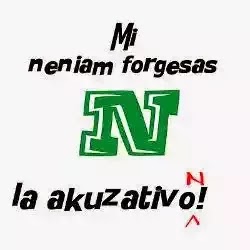 |
| Credit to Cafe Press |
I defiantly need practice. Right now I kludge around Esperanto sentences sounding like a cave man. I defiantly need practice remembering words on the fly. According to Memrise I know over 2923 words but I reality it must be 1/3 that that I really know. Also consider that I am dong several decks that duplicate many of them. I do cards a lot at Memrise, enough so that I have earned the badge of Memonist with over 2,500,000 pts almost exclusively spent trying to memorize Esperanto words.
I am now going through the book 'Ni Parolu Espernaton Kune' by Charlotte Kohrs, M,A. It has been a great little starter book for me from Esperanto-usa.org it has all the basics of speaking Esperanto along with simple reading sentences. The print quality is that of a printer on fast draft mode but is "good" enough to read comfortably. I am using its simple sentences to help me learn the finer points (such as the accusative -n) and reading simple sentences.
Off and on I also read a few sentences of Gerda Malaperis at ReadLang.com as the site helps with words I do not know by letting me click on them to get a translation only as needed.
Travis, A helpful English language teacher is helping me with sentence structure via email. By writing some basic sentences to him in EO and letting him edit them it will help me to put together better sentences. This will give me a Very Big head start for when the Duolingo course starts.
He is learning Esperanto himself but is catching on quickly as seen here in his YouTube Pensoj en Esperanto (Journals) . Being an English language teacher by trade and familiar with language structure it will be very helpful to him as he learns and continues on to help others like me. I really appreciate his help.
So practice makes proficiency:
Mi ankaŭ need al praktikan skribon. Mi estas tre Novan studenton. Mi koni that al skribi pli estas bonan ideon. La vortoj mi koni on la flugi does ne allow mi tre multaj sentences sen krokodoli English mixed en.
Lol. Ouch that hurt trying to read that back to myself. Don't worry I won't do any more of that to you. Maybe by next post my attempt at making on the fly sentences will not be so painful and perhaps also will properly use the accusative -n as well. No one will at least be able to accuse me of not trying. ;)
This post brought to you by the letter -N and Cafe Press for the picture.